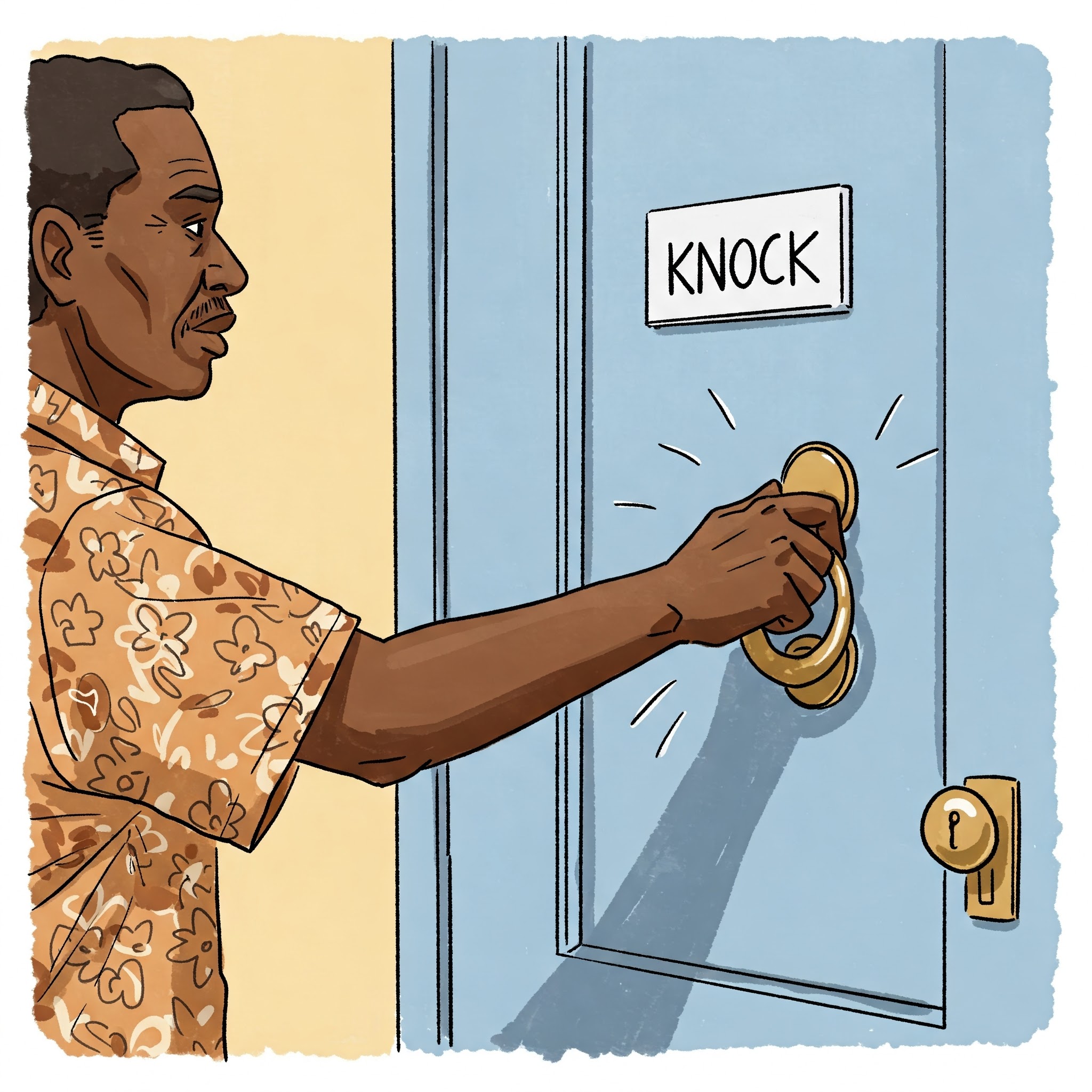Knock
Definition
Knock is a noun and a verb. As a verb, it means to strike a surface noisily to attract attention, to collide with something forcefully, or to criticize someone or something. As a noun, it refers to the sound produced by knocking, a collision, or a critical remark.
Parts of Speech
- Verb
- Noun
Pronunciation
American English
- IPA Pronunciation: /nɑːk/
- Respelling: nok
British English
- IPA Pronunciation: /nɒk/
- Respelling: nok
Etymology
The word "knock" originates from Middle English "knokken," derived from Old English "cnocian," meaning "to strike." Its roots are found in Proto-Germanic "*knukoną" and are related to Dutch "knokken" (to fight) and German "knocken" (to knock).
Derivatives
- Knocker (noun)
- Knocking (noun/verb)
- Knockout (noun/adjective)
- Overknock (verb, rare)
- Knockback (noun, informal)
Synonyms
- Tap
- Strike
- Criticize
Antonyms
- None
Usage
The term "knock" is widely used in both literal and figurative contexts. For example, "She knocked on the door before entering," or "He knocked her ideas as impractical."
Related Terms
- Tap: A light knock or touch.
- Pound: To strike heavily or repeatedly.
- Critique: A detailed analysis or assessment, sometimes negative.
Detailed Definitions
Verb
- To strike a surface noisily to attract attention: Often used when seeking entry or acknowledgment.
- Example: "Please knock before you enter."
- To collide with something forcefully: Refers to hitting or pushing against something.
- Example: "The ball knocked over the vase."
- To criticize someone or something: Describes the act of making disparaging comments.
- Example: "She knocked the new policy for being ineffective."
Noun
- A sound made by striking a surface: Describes the noise associated with knocking.
- Example: "He heard a knock at the door."
- A collision or impact: Refers to a forceful or accidental hit.
- Example: "The car had a minor knock on the bumper."
- A critical remark or comment: Indicates a negative judgment or criticism.
- Example: "He took the knock in stride and improved his work."
knock



🇨🇳 Mandarin
- 敲 (qiāo) - Knock (verb)
- IPA Pronunciation: /tɕʰjɑʊ/
- Respelling in English: "chyaow"
- 敲打 (qiāo dǎ) - Knocking (noun)
- IPA Pronunciation: /tɕʰjɑʊ tɑ/
- Respelling in English: "chyaow dah"
🇮🇳 Hindi
- खटखटाना (khaṭkhaṭānā) - Knock (verb)
- IPA Pronunciation: /kʰəʈ.kʰəʈaːnaː/
- Respelling in English: "khat-khat-ana"
- खटखटाहट (khaṭkhaṭāhaṭ) - Knocking (noun)
- IPA Pronunciation: /kʰəʈ.kʰəʈaːhəʈ/
- Respelling in English: "khat-khat-ahat"
🇪🇸 Spanish
- Golpear - Knock (verb)
- IPA Pronunciation: /golˈpe.aɾ/
- Respelling in English: "gol-pe-ar"
- Golpe - Knocking (noun)
- IPA Pronunciation: /ˈgol.pe/
- Respelling in English: "gol-pe"
🇫🇷 French
- Frapper - Knock (verb)
- IPA Pronunciation: /fʁape/
- Respelling in English: "fra-pay"
- Coup - Knocking (noun)
- IPA Pronunciation: /ku/
- Respelling in English: "koo"
🇸🇦 Modern Standard Arabic
- ضرب (darb) - Knock (verb)
- IPA Pronunciation: /dʕarb/
- Respelling in English: "darb"
- الطرق (al-tariq) - Knocking (noun)
- IPA Pronunciation: /atˤarik/
- Respelling in English: "al-tar-ik"
🇧🇩 Bengali
- ঠোকা (ṭhōkā) - Knock (verb)
- IPA Pronunciation: /ʈʰoka/
- Respelling in English: "tho-ka"
- ঠোঁক (ṭhŏnka) - Knocking (noun)
- IPA Pronunciation: /ʈʰõka/
- Respelling in English: "thon-ka"
🇷🇺 Russian
- Стучать (stuchat') - Knock (verb)
- IPA Pronunciation: /stʊˈt͡ɕatʲ/
- Respelling in English: "stu-chat"
- Стук (stuk) - Knocking (noun)
- IPA Pronunciation: /stuk/
- Respelling in English: "stook"
🇵🇹 Portuguese
- Bater - Knock (verb)
- IPA Pronunciation: /ˈba.tɛɾ/
- Respelling in English: "ba-ter"
- Batida - Knocking (noun)
- IPA Pronunciation: /bɐ.ˈti.dɐ/
- Respelling in English: "ba-ti-da"
🇮🇩 Indonesian
- Mengetuk - Knock (verb)
- IPA Pronunciation: /mənəˈtʊk/
- Respelling in English: "mə-nə-tuk"
- Ketukan - Knocking (noun)
- IPA Pronunciation: /kətuˈkɑn/
- Respelling in English: "kə-tu-kan"
🇩🇪 German
- Klopfen - Knock (verb)
- IPA Pronunciation: /ˈklɔpfən/
- Respelling in English: "klop-fen"
- Klopf - Knocking (noun)
- IPA Pronunciation: /klɔpf/
- Respelling in English: "klop"
🇯🇵 Japanese
- ノックする (Nokku suru) - Knock (verb)
- IPA Pronunciation: /nok.ku su.ɾu/
- Respelling in English: "nok-ku su-ru"
- ノック (Nokku) - Knocking (noun)
- IPA Pronunciation: /nok.ku/
- Respelling in English: "nok-ku"
🇻🇳 Vietnamese
- Gõ cửa - Knock (verb)
- IPA Pronunciation: /ɣɔ kɨa/
- Respelling in English: "go kwa"
- Tiếng gõ - Knocking (noun)
- IPA Pronunciation: /tiəŋ ɣɔ/
- Respelling in English: "tyeng go"
🇰🇷 Korean
- 노크하다 (nokeuhada) - Knock (verb)
- IPA Pronunciation: /nokʰuhada/
- Respelling in English: "no-keu-ha-da"
- 노크 (nokeu) - Knocking (noun)
- IPA Pronunciation: /nokʰu/
- Respelling in English: "no-keu"
🇹🇷 Turkish
- Tıklamak - Knock (verb)
- IPA Pronunciation: /tɯklɑˈmɑk/
- Respelling in English: "tuh-kla-mak"
- Vuruş - Knocking (noun)
- IPA Pronunciation: /vuˈɾuʃ/
- Respelling in English: "vuh-roosh"
🇵🇰 Urdu
- کھٹکھٹانا (khaṭkhaṭānā) - Knock (verb)
- IPA Pronunciation: /kʰəʈ.kʰəʈaːnaː/
- Respelling in English: "khat-khat-ana"
- کھٹکھٹاہٹ (khaṭkhaṭāhaṭ) - Knocking (noun)
- IPA Pronunciation: /kʰəʈ.kʰəʈaːhəʈ/
- Respelling in English: "khat-khat-ahat"





